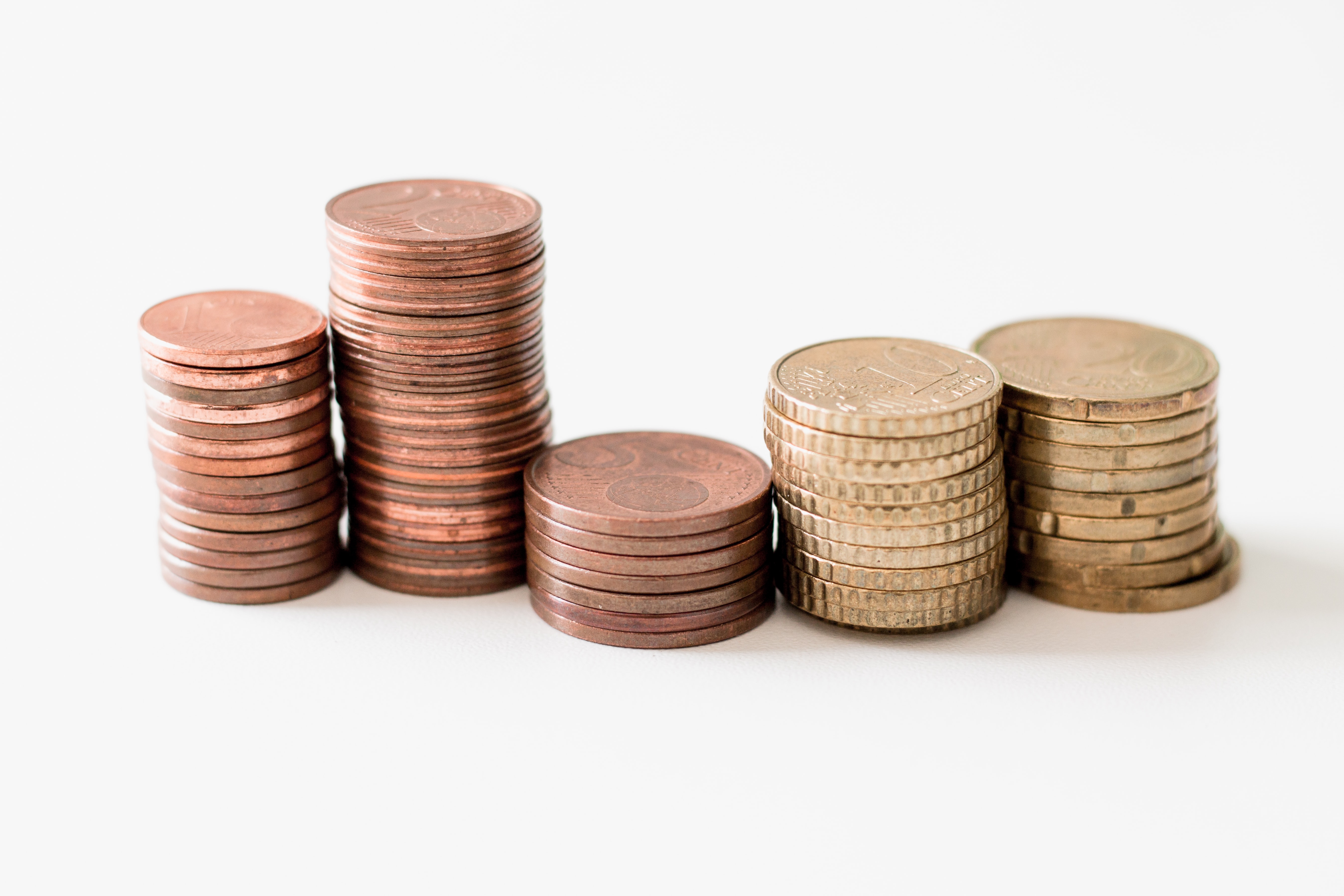So many Americans experience ongoing financial stress because their expenses exceed their income: meaning the money runs out before the month is over. So what are your options if you find there is too much month left at the end of your money?

Between bills, necessary expenses like gas and food, to non-essential spending like entertainment and eating out, Americans find themselves at the end of the month with no money left.
And it’s hard to commit to any sort of financial goal if you are barely covering your monthly expenses.
So what are your options?
How can you start paying off debt, saving, and investing if you don’t have excess income?
Well, you have three options
- Decrease your expenses
- Increase your income
- Both
And I realize that this is not innovative.
It’s probably the answer you have heard many times.
But there is no other hidden secret.
Before you click away, let’s walk through each of these and how they might solve your problem.
Let’s take a look at every possible scenario, see what options work for you, and help you better understand why your decisions are affecting your finances.
The best place to begin is by assessing your necessary expenses.
If you don’t have enough money left we need to figure out where your money is going, and what is possible to reduce.
Let’s start with your essentials and predictable expenses.
What can you reduce or cut from your necessary bills?
Your necessary bills are all the things you need to live your day-to-day life.
- Rent/Mortgage
- Utilities
- Cell phone/Internet
- Insurances
If it’s been a while since you contacted any of your insurance providers or cell phone companies, now is a great time!
Bills like car insurance, and internet can increase over time without you even noticing.
I bet we can all agree on how they are professional swindlers.
But it’s important because these increases make a difference in your bottom line.
Even if they are small.
Yes, I realize it is annoying to have to do this, but it is necessary if you want to pay less.
Call your providers, ask for deals, shop around, threaten to leave, and remember you might have to do this every few years or so.
Once you have your bills reduced as much as possible it’s time to evaluate the things we might not want to admit are an issue.
On a bit of a larger scale, we have to consider our rent/mortgage.
Is your rent or mortgage more than you can afford?
Housing is always a touchy subject because most can justify why they need to stay where they are; it’s close to family, it’s close to work, the amenities are nice, I need the space, elsewhere isn’t possible…
But the most important aspects of housing like safety and reliability have nothing to do with the number of bedrooms you have or how fancy your apartment pool is.
Business Insider published an article stating that many house poor American’s were taking on part-time jobs to keep themselves afloat.
“In a recent survey, 40% of homeowners with mortgages said they work second, full-time jobs to afford housing expenses. A majority of the 1,002 people surveyed by ConsumerAffairs feel like they can’t afford their housing expenses, and did not anticipate the extra costs of upkeep when they bought their homes.”
It’s crazy that people would prefer to work more than find a way to pay less.
So I will ask one more time…
Are you living somewhere you can’t afford?
It is a yes, or no question.
Let’s move on.
Some other areas to consider reducing include variable expenses like groceries and eating out.
When we started our journey, my husband and I were astounded by the amount of money we spent on food.
And it was obvious this was going to be a must cut from our budget.
So we started meal planning, prepping, going to the store less, eating out less, drinking at home instead of going out, and finding other ways to reduce our food costs.

Even with the rising prices, it is possible to eat more from your pantry, get less take-out, and reduce waste.
Consider how much money per month is going towards food? Do you need to adjust that amount? Be honest and ask yourself if you could spend less.
Now it’s time to evaluate the rest of your spending, otherwise known as your non-essential expenses.
These are the things you don’t need to spend money on like, travel, entertainment, gifts, and getting your nails or hair done.
Anything that is not necessary to your livelihood.
If you have ever done a spending analysis, which you should, these expenses become very obvious.
Now, if you don’t have enough money left at the end of the month, you shouldn’t be spending anything on “extras.”
And here is where the advice gets a little sticky.
Most people are unwilling to sacrifice their feel-good purchases before making sure their bills get paid on time.
This is when groceries go on a credit card because you already had your nails done.
Or you are late on your daycare payments because you went out to eat five days last week.
You need to ask yourself if you ACTUALLY don’t have any money left or are you irresponsibly spending it?
Your money should be spent in the following order:
- Necessary expenses/bills like food, shelter, and transportation
- Debt payments
- Financial goals
- Wants
You might not have any money left because you’re showing preferential treatment to the wrong things.
It is important to not forget about ourselves, our values, and what brings us happiness but we have to be realistic in what we can afford. This includes making sure our basic needs are met first.
Another place to start pairing down is yearly subscriptions.
Good examples of these include:
Streaming services like Netflix and Hulu. Memberships like wholesale stores and amazon. Even auto deliveries, and monthly iCloud storage.
What from your list do you use regularly, and what is possible to cut out.
What do you need and what do you not?

Even Amazon has gotten quite risky with their prime membership as they still offer free shipping and fast delivery even for non-prime members.
Test how much you use the subscription or membership.
Is it worth it? And evaluate if you can actually afford it.
It is easy to cancel most of the memberships you don’t use or don’t find to be worth the price tag.
Pairing down some of your monthly bills and yearly subscriptions should put a few extra bucks in your pocket.
Remember, if you don’t have money left at the end of the month, unnecessary subscriptions shouldn’t be a part of your budget at all.
Now, it is possible that you don’t spend a lot on unnecessary things, and your expenses are down to the bare minimum.
Two things might be happening here, or potentially both:
- Your debt payments are eating away at the rest of your income
- You don’t bring in enough money
It is possible that your previous self wasn’t the brightest when it came to finances, and you have too much debt.
That might include car payments, student loan payments, and even credit card debt.
If this is you, you might have to take a deep dive into your options.
Research from every angle and make sure you get all your bases covered by fulling understanding and organizing your debts.
This includes all and any student debts, personal debts, credit cards, and the dreaded car payment.
Did you buy more car than you can afford? Is it necessary for you to have that car? If you have to justify the purchase then no you probably don’t need it.
You could consider consolidation or income-based repayment plans.
Make any phone calls you need and be deliberate about finding ways to reduce your debts, interest, and don’t forget to give yourself grace.
Remember, it’s ok if you made some not-so-great financial choices in the past.
The problem is eventually we have to deal with those decisions.
Here comes yet another unideal situation.
You might not be making enough.
This is another example of something most refuse or convince themselves is not an option.
If you don’t have enough money, you need to find more of it.
And no one ever wants to get a second job or start a side hustle if they don’t want to, but sometimes you have to.
A second job is not something you need to keep forever. I will remind you that this is usually temporary.
But sometimes, it is necessary.

If you want financial freedom you have to do what it takes to get it.
Over the last few months, I have jumped on discovery calls with so many of you in this exact predicament.
And the problem is most people I talk to are resistant to doing what is necessary to create change.
You don’t want to work more or find an excuse as to why you can’t.
You don’t want to move, or turn in a car that is obviously too expensive.
And we convince ourselves it’s not possible by saying we don’t have a choice. But we do.
I get it. It sucks. And I’m not here to try and make you feel bad, but to remind you that you control your decisions.
And the right answer is to do the difficult things.
Because not being able to pay your bills is just as stressful as getting a second job.
Ask yourself these questions:
- Organize your spending/bills/due dates – you need to analyze your spending. Where is your money going that it’s leaving you with nothing left?
- How much money are you bringing in? How much do you need to live? Are you bringing in enough?
- Is this a season? Are you just scraping by because you are a student with little time to work? Are you a one-income family to save on daycare costs or are you paying for a daycare where the situation is temporary? This is where you just find a way to survive.
- Are you choosing a lifestyle you can’t afford? Are you keeping the expensive car or living in an overpriced city? Having kids means committing to the financial responsibilities. Owning a home means being able to pay for the repairs. We have to take responsibility and stop blaming our circumstances.
- Where are your financial priorities? Are you spending your money in the correct order?
Interested in reading more?
The Great Resignation and I was a part of it
How to pick a debt payoff strategy